九年级中考英语动词复习课件(共33张PPT)
文档属性
| 名称 | 九年级中考英语动词复习课件(共33张PPT) |

|
|
| 格式 | pptx | ||
| 文件大小 | 1.3MB | ||
| 资源类型 | 教案 | ||
| 版本资源 | 通用版 | ||
| 科目 | 英语 | ||
| 更新时间 | 2025-01-09 09:17:29 | ||
图片预览

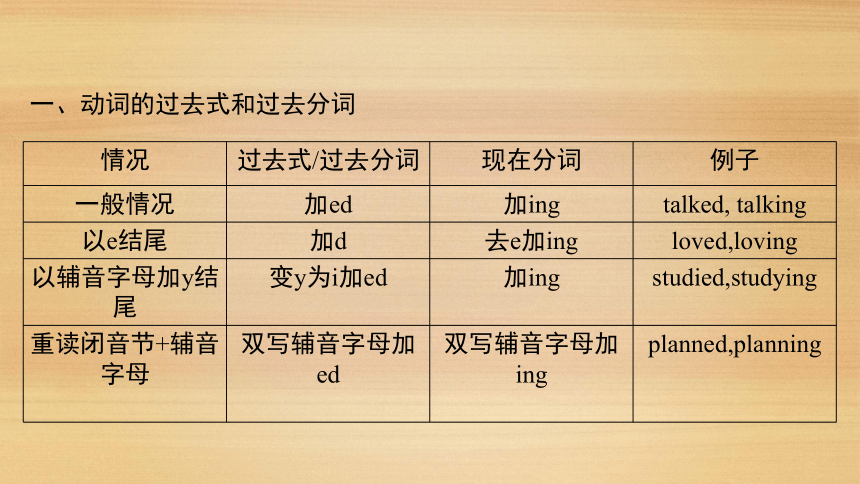
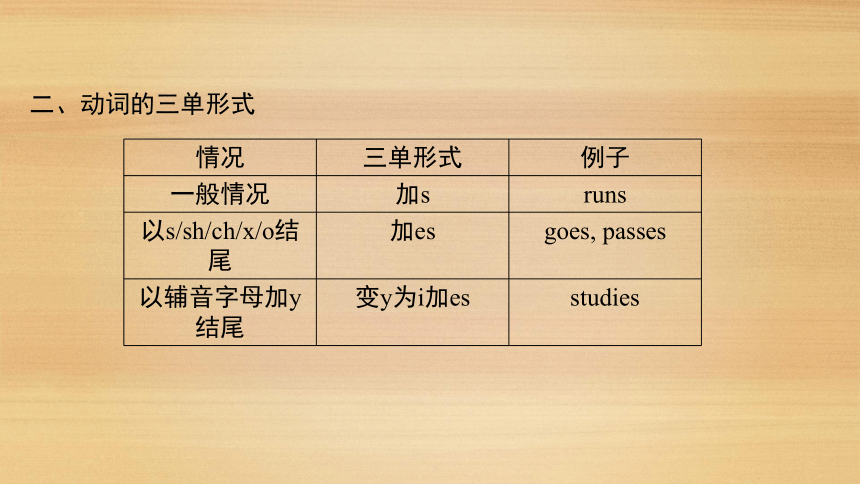
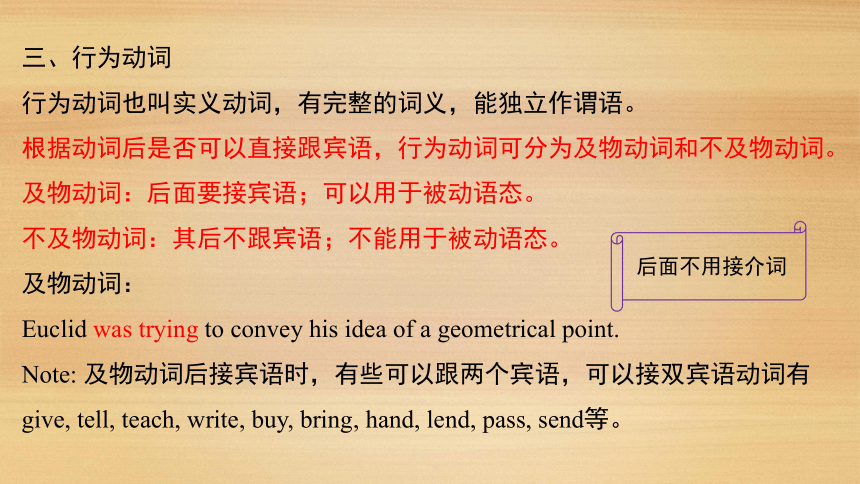
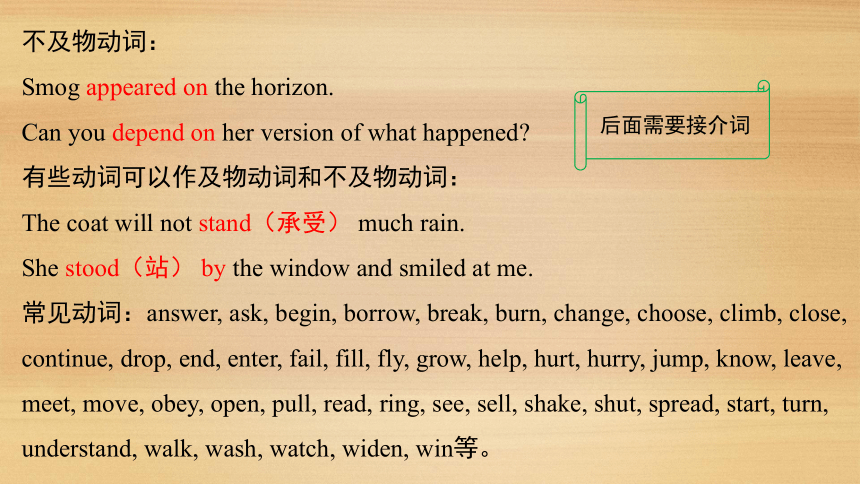

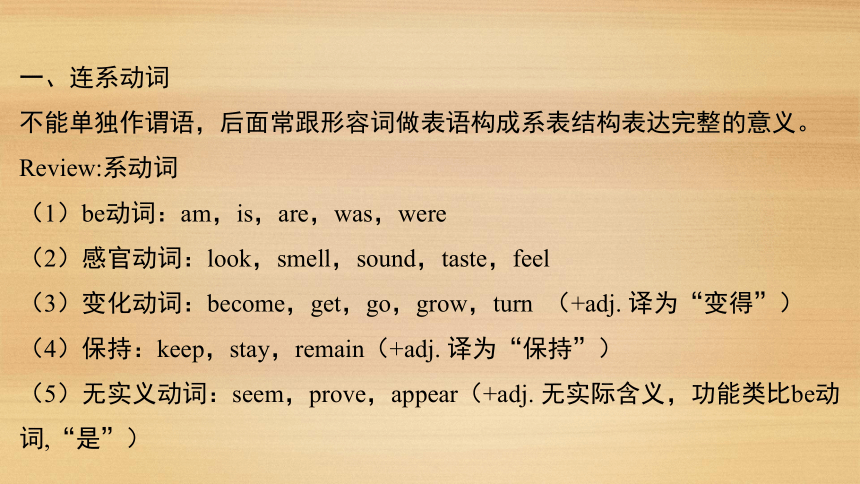
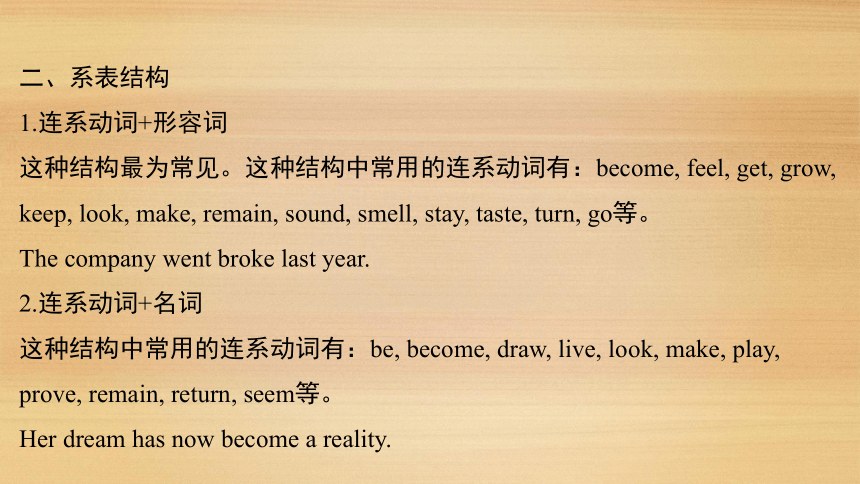
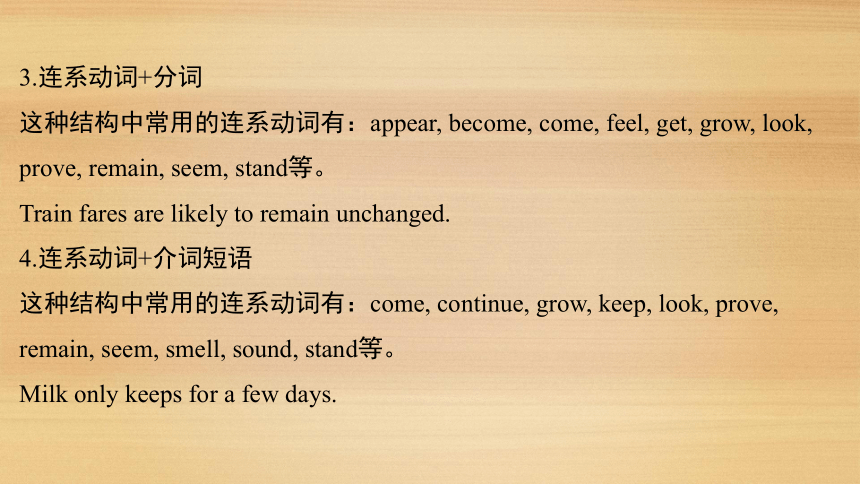
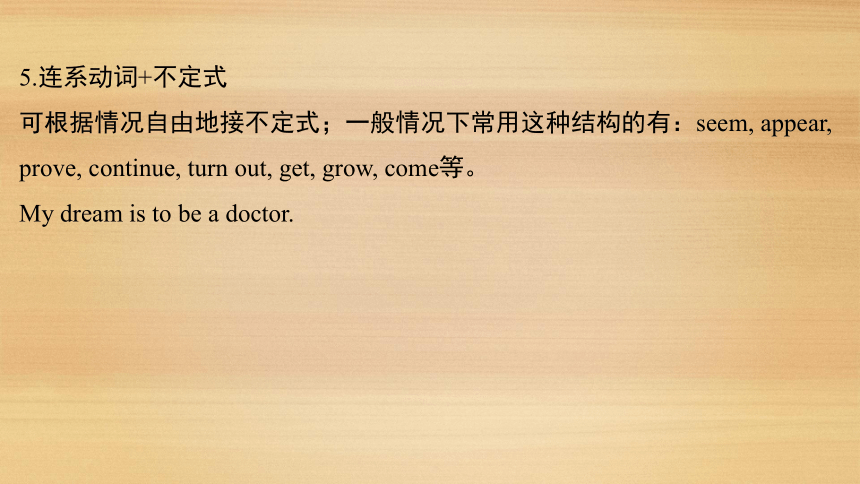
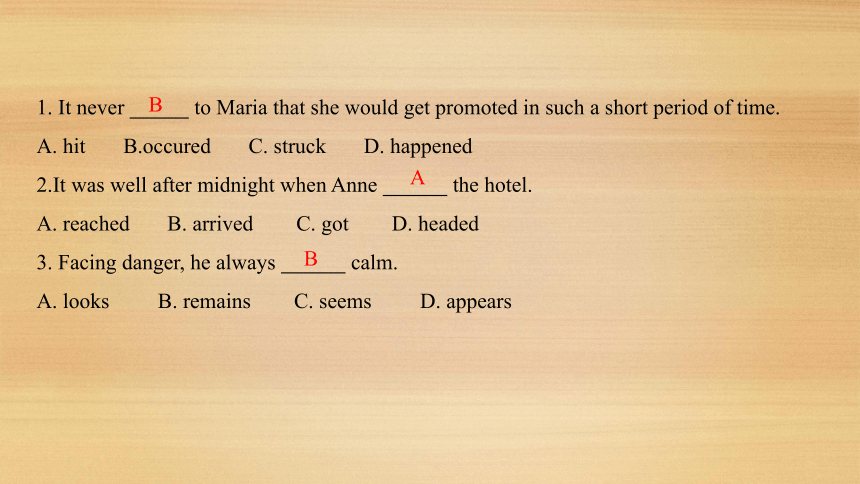
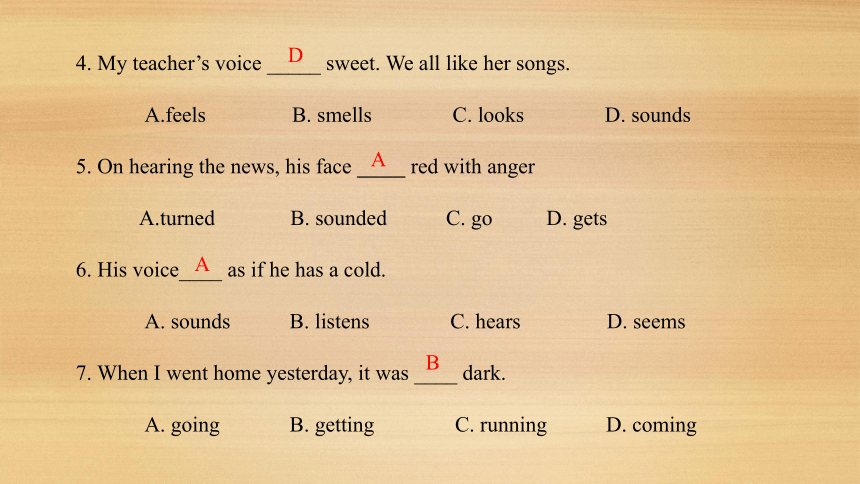
文档简介
(共33张PPT)
1
实义动词
一、动词的过去式和过去分词
情况 过去式/过去分词 现在分词 例子
一般情况 加ed 加ing talked, talking
以e结尾 加d 去e加ing loved,loving
以辅音字母加y结尾 变y为i加ed 加ing studied,studying
重读闭音节+辅音字母 双写辅音字母加ed 双写辅音字母加ing planned,planning
二、动词的三单形式
情况 三单形式 例子
一般情况 加s runs
以s/sh/ch/x/o结尾 加es goes, passes
以辅音字母加y结尾 变y为i加es studies
三、行为动词
行为动词也叫实义动词,有完整的词义,能独立作谓语。
根据动词后是否可以直接跟宾语,行为动词可分为及物动词和不及物动词。
及物动词:后面要接宾语;可以用于被动语态。
不及物动词:其后不跟宾语;不能用于被动语态。
及物动词:
Euclid was trying to convey his idea of a geometrical point.
Note: 及物动词后接宾语时,有些可以跟两个宾语,可以接双宾语动词有give, tell, teach, write, buy, bring, hand, lend, pass, send等。
后面不用接介词
不及物动词:
Smog appeared on the horizon.
Can you depend on her version of what happened
有些动词可以作及物动词和不及物动词:
The coat will not stand(承受) much rain.
She stood(站) by the window and smiled at me.
常见动词:answer, ask, begin, borrow, break, burn, change, choose, climb, close, continue, drop, end, enter, fail, fill, fly, grow, help, hurt, hurry, jump, know, leave, meet, move, obey, open, pull, read, ring, see, sell, shake, shut, spread, start, turn, understand, walk, wash, watch, widen, win等。
后面需要接介词
2
连系动词
一、连系动词
不能单独作谓语,后面常跟形容词做表语构成系表结构表达完整的意义。
Review:系动词
(1)be动词:am,is,are,was,were
(2)感官动词:look,smell,sound,taste,feel
(3)变化动词:become,get,go,grow,turn (+adj. 译为“变得”)
(4)保持:keep,stay,remain(+adj. 译为“保持”)
(5)无实义动词:seem,prove,appear(+adj. 无实际含义,功能类比be动词,“是”)
二、系表结构
1.连系动词+形容词
这种结构最为常见。这种结构中常用的连系动词有:become, feel, get, grow, keep, look, make, remain, sound, smell, stay, taste, turn, go等。
The company went broke last year.
2.连系动词+名词
这种结构中常用的连系动词有:be, become, draw, live, look, make, play, prove, remain, return, seem等。
Her dream has now become a reality.
3.连系动词+分词
这种结构中常用的连系动词有:appear, become, come, feel, get, grow, look, prove, remain, seem, stand等。
Train fares are likely to remain unchanged.
4.连系动词+介词短语
这种结构中常用的连系动词有:come, continue, grow, keep, look, prove, remain, seem, smell, sound, stand等。
Milk only keeps for a few days.
5.连系动词+不定式
可根据情况自由地接不定式;一般情况下常用这种结构的有:seem, appear, prove, continue, turn out, get, grow, come等。
My dream is to be a doctor.
1. It never to Maria that she would get promoted in such a short period of time.
A. hit B.occured C. struck D. happened
2.It was well after midnight when Anne the hotel.
A. reached B. arrived C. got D. headed
3. Facing danger, he always calm.
A. looks B. remains C. seems D. appears
B
A
B
4. My teacher’s voice _____ sweet. We all like her songs.
A.feels B. smells C. looks D. sounds
5. On hearing the news, his face red with anger
A.turned B. sounded C. go D. gets
6. His voice____ as if he has a cold.
A. sounds B. listens C. hears D. seems
7. When I went home yesterday, it was ____ dark.
A. going B. getting C. running D. coming
D
A
A
B
3
情态动词
一、定义
情态动词:主要用于表明说话者对某一行为的态度和观点,包括能力、可能、义务、必要、允诺、猜测等,不能单独作谓语,必须和动词原形一起构成谓语
二、特点
情态动词过去式比原形委婉
must (语气最强)表义务“一定,必须”,这在说话人主观看来是没有选择余地的 可用have to或have got to来代替,但have to或have got to强调客观,有“不得不,只好”的意思 You must study hard.
主观认为
You have to study hard.
客观必须
表推测,表示“一定(是)······” She must be James girlfriend.
can 表能力,“能,能够” 注:be able to也是表示能力,但是强调的是具体的能力,而can表示理论上的能力 She can dance.
They were able to carry the flag to victory.
表推测,用于否定句和疑问句中,“肯定不是......”,“不可能......” She cannot be Toms mother.
表许可,“可以” Can I sit here
could (语气缓和)can的过去式,“能够” I could do it.
表委婉地提出问题或表明看法 Could you pass me your passport
表示惊讶、怀疑、不相信的情绪 Who could have taken them away
表示“可能、可能会” We could all be millionaires one day.
can和could固定搭配:
(1)cannot help but do=have to do不得不
She can’t help but tell me the truth.
(2)cannot help doing 禁不住
Hearing that humorous story, they can’t help laughing.
(3)can’t wait to do迫不及待
Tony can’t wait to enter the concert.
(4)cannot...too/over 再......也不过分,越......越好
You can’t be too careful when driving.
should 表义务,“应该” I should ask him first.
表必然性推测,“估计,定然” She should be here in a minute.
would 表推测,“可能” He would bring good news.
表请求,用于疑问句“可以......吗?” Would you lend me your pen
表过去的意愿 I asked him if he would help me with my writing.
表过去的意图 He would see her the next day, so he didn't write to her.
may 表可能,(可能性小)“可能” She may have left.
表许可,意为“可以”,一般用于疑问句和否定句 May I help you
May I use your cellphone
might 表可能(可能性更小) He might still be waiting at the door.
询问建议,语气更缓和 Might I read your paper
ought to 可以用should代替,表示“应该......”(语气上没有那么坚定) They ought to attend the meeting.
dare 意为“敢”,既可以为情态动词,也可以作为实义动词 She dares not go by herself.(情态)
Does she dare to go by herself (实义)
need 既可以作情态动词,也可以作实义动词;作情态动词时,表“需要” You needn't worry about it because it is not your fault.
情态动词的否定形式,直接在情态动词后加not。
1. “She must be in the dormitory now.” “No, she be there. I saw her in the classroom a minute ago.”
A. mustn’t B. can’t C. couldn’t D. wouldn’t
2. “You borrow my notes provided you take care of them.” I told my friend.
A. could B. should C. must D. can
3. You clean the classroom, but you do so at once.
A. need, need B. must, must C. needn’t, must D. must, needn’t
4. Since the weather is fine we walk for a while.
A. may B. must C. might as well D. will
B
D
D
C
5. We promised them to there by six. Now it’s six thirty already, and they for us impatiently.
A. wait B. had waited C. should wait D. must be waiting
6. I can’t help but the fact that he is a talented football player.
A. to admit B. admit C. admitting D. admitted
7.-Could you help me repair my computer
-Sorry, I help you. I’m busy with my homework.
A. can’t B. mustn’t C. needn’t D. shouldn’t
D
B
C
8. I promise you that we shall get you a decent job soon.
A. be able to B. able to C. might as well D. can able to
A
(重点)情态动词+have done:
①must have done “肯定做过”
He didn’t come to work yesterday. He must have been ill.
②can’t/couldn’t have done 不可能做过
Billy is an honest man. He can’t/couldn’t have stolen the money.
③may/might have done “可能做过”
There is a traffic accident. Someone may/might have been injured.
④could have done “本可以做到”(事实上没有做到)
He could have passed the exam, but he didn’t go over his lessons.
⑤should/ought to have done “本应该做过”(事实上没做过)
You should have started earlier, but you didn’t.
⑥needn’t have done “本不必要做”(事实上做了)
You needn’t have woken me up so early, for today is Sunday.
⑦didn’t need to do“本不必要做”(事实上也没去做)
I didn’t need to do the washing-up. My mom did it.
1. He the 8:20 bus because he didn’t leave home till 8:25.
A. couldn’t have caught B. ought to have caught
C. shouldn’t have caught D. must not have caught
2.We came early and had to wait two hours before the ceremony began. We .
A. need not hurry B. needn’t have hurried
C. should not hurry D. can’t have hurried
3. You that car with the brakes out of order. You might have had a serious accident.
A. ought to drive B. oughtn’t to drive
C.ought to have driven D.oughtn’t to have driven
A
B
D
4. From what you said, she you all about it.
A. must tell B. must be telling C. tells D. must have told
D
4
助动词
一、定义
本身没有实际意义,不能单独做谓语,主要帮助实意动词构成谓语,表示时态、语态、语气、否定句和疑问句等。
二、分类
be类:am, is, are, was, were, being, been
do类:do, does, did
have类:have, has, had
will类:will, shall
三、助动词功能
①帮助行为动词构成否定句和疑问句。
She doesn't work here, does she
②帮助行为动词构成各种时态。
Matter is constantly changing and moving.
③帮助行为动词构成被动语态。
The topic was discussed in detail during the meeting.
④帮助动词构成各种语气。
Don't be afraid of making mistakes.
1
实义动词
一、动词的过去式和过去分词
情况 过去式/过去分词 现在分词 例子
一般情况 加ed 加ing talked, talking
以e结尾 加d 去e加ing loved,loving
以辅音字母加y结尾 变y为i加ed 加ing studied,studying
重读闭音节+辅音字母 双写辅音字母加ed 双写辅音字母加ing planned,planning
二、动词的三单形式
情况 三单形式 例子
一般情况 加s runs
以s/sh/ch/x/o结尾 加es goes, passes
以辅音字母加y结尾 变y为i加es studies
三、行为动词
行为动词也叫实义动词,有完整的词义,能独立作谓语。
根据动词后是否可以直接跟宾语,行为动词可分为及物动词和不及物动词。
及物动词:后面要接宾语;可以用于被动语态。
不及物动词:其后不跟宾语;不能用于被动语态。
及物动词:
Euclid was trying to convey his idea of a geometrical point.
Note: 及物动词后接宾语时,有些可以跟两个宾语,可以接双宾语动词有give, tell, teach, write, buy, bring, hand, lend, pass, send等。
后面不用接介词
不及物动词:
Smog appeared on the horizon.
Can you depend on her version of what happened
有些动词可以作及物动词和不及物动词:
The coat will not stand(承受) much rain.
She stood(站) by the window and smiled at me.
常见动词:answer, ask, begin, borrow, break, burn, change, choose, climb, close, continue, drop, end, enter, fail, fill, fly, grow, help, hurt, hurry, jump, know, leave, meet, move, obey, open, pull, read, ring, see, sell, shake, shut, spread, start, turn, understand, walk, wash, watch, widen, win等。
后面需要接介词
2
连系动词
一、连系动词
不能单独作谓语,后面常跟形容词做表语构成系表结构表达完整的意义。
Review:系动词
(1)be动词:am,is,are,was,were
(2)感官动词:look,smell,sound,taste,feel
(3)变化动词:become,get,go,grow,turn (+adj. 译为“变得”)
(4)保持:keep,stay,remain(+adj. 译为“保持”)
(5)无实义动词:seem,prove,appear(+adj. 无实际含义,功能类比be动词,“是”)
二、系表结构
1.连系动词+形容词
这种结构最为常见。这种结构中常用的连系动词有:become, feel, get, grow, keep, look, make, remain, sound, smell, stay, taste, turn, go等。
The company went broke last year.
2.连系动词+名词
这种结构中常用的连系动词有:be, become, draw, live, look, make, play, prove, remain, return, seem等。
Her dream has now become a reality.
3.连系动词+分词
这种结构中常用的连系动词有:appear, become, come, feel, get, grow, look, prove, remain, seem, stand等。
Train fares are likely to remain unchanged.
4.连系动词+介词短语
这种结构中常用的连系动词有:come, continue, grow, keep, look, prove, remain, seem, smell, sound, stand等。
Milk only keeps for a few days.
5.连系动词+不定式
可根据情况自由地接不定式;一般情况下常用这种结构的有:seem, appear, prove, continue, turn out, get, grow, come等。
My dream is to be a doctor.
1. It never to Maria that she would get promoted in such a short period of time.
A. hit B.occured C. struck D. happened
2.It was well after midnight when Anne the hotel.
A. reached B. arrived C. got D. headed
3. Facing danger, he always calm.
A. looks B. remains C. seems D. appears
B
A
B
4. My teacher’s voice _____ sweet. We all like her songs.
A.feels B. smells C. looks D. sounds
5. On hearing the news, his face red with anger
A.turned B. sounded C. go D. gets
6. His voice____ as if he has a cold.
A. sounds B. listens C. hears D. seems
7. When I went home yesterday, it was ____ dark.
A. going B. getting C. running D. coming
D
A
A
B
3
情态动词
一、定义
情态动词:主要用于表明说话者对某一行为的态度和观点,包括能力、可能、义务、必要、允诺、猜测等,不能单独作谓语,必须和动词原形一起构成谓语
二、特点
情态动词过去式比原形委婉
must (语气最强)表义务“一定,必须”,这在说话人主观看来是没有选择余地的 可用have to或have got to来代替,但have to或have got to强调客观,有“不得不,只好”的意思 You must study hard.
主观认为
You have to study hard.
客观必须
表推测,表示“一定(是)······” She must be James girlfriend.
can 表能力,“能,能够” 注:be able to也是表示能力,但是强调的是具体的能力,而can表示理论上的能力 She can dance.
They were able to carry the flag to victory.
表推测,用于否定句和疑问句中,“肯定不是......”,“不可能......” She cannot be Toms mother.
表许可,“可以” Can I sit here
could (语气缓和)can的过去式,“能够” I could do it.
表委婉地提出问题或表明看法 Could you pass me your passport
表示惊讶、怀疑、不相信的情绪 Who could have taken them away
表示“可能、可能会” We could all be millionaires one day.
can和could固定搭配:
(1)cannot help but do=have to do不得不
She can’t help but tell me the truth.
(2)cannot help doing 禁不住
Hearing that humorous story, they can’t help laughing.
(3)can’t wait to do迫不及待
Tony can’t wait to enter the concert.
(4)cannot...too/over 再......也不过分,越......越好
You can’t be too careful when driving.
should 表义务,“应该” I should ask him first.
表必然性推测,“估计,定然” She should be here in a minute.
would 表推测,“可能” He would bring good news.
表请求,用于疑问句“可以......吗?” Would you lend me your pen
表过去的意愿 I asked him if he would help me with my writing.
表过去的意图 He would see her the next day, so he didn't write to her.
may 表可能,(可能性小)“可能” She may have left.
表许可,意为“可以”,一般用于疑问句和否定句 May I help you
May I use your cellphone
might 表可能(可能性更小) He might still be waiting at the door.
询问建议,语气更缓和 Might I read your paper
ought to 可以用should代替,表示“应该......”(语气上没有那么坚定) They ought to attend the meeting.
dare 意为“敢”,既可以为情态动词,也可以作为实义动词 She dares not go by herself.(情态)
Does she dare to go by herself (实义)
need 既可以作情态动词,也可以作实义动词;作情态动词时,表“需要” You needn't worry about it because it is not your fault.
情态动词的否定形式,直接在情态动词后加not。
1. “She must be in the dormitory now.” “No, she be there. I saw her in the classroom a minute ago.”
A. mustn’t B. can’t C. couldn’t D. wouldn’t
2. “You borrow my notes provided you take care of them.” I told my friend.
A. could B. should C. must D. can
3. You clean the classroom, but you do so at once.
A. need, need B. must, must C. needn’t, must D. must, needn’t
4. Since the weather is fine we walk for a while.
A. may B. must C. might as well D. will
B
D
D
C
5. We promised them to there by six. Now it’s six thirty already, and they for us impatiently.
A. wait B. had waited C. should wait D. must be waiting
6. I can’t help but the fact that he is a talented football player.
A. to admit B. admit C. admitting D. admitted
7.-Could you help me repair my computer
-Sorry, I help you. I’m busy with my homework.
A. can’t B. mustn’t C. needn’t D. shouldn’t
D
B
C
8. I promise you that we shall get you a decent job soon.
A. be able to B. able to C. might as well D. can able to
A
(重点)情态动词+have done:
①must have done “肯定做过”
He didn’t come to work yesterday. He must have been ill.
②can’t/couldn’t have done 不可能做过
Billy is an honest man. He can’t/couldn’t have stolen the money.
③may/might have done “可能做过”
There is a traffic accident. Someone may/might have been injured.
④could have done “本可以做到”(事实上没有做到)
He could have passed the exam, but he didn’t go over his lessons.
⑤should/ought to have done “本应该做过”(事实上没做过)
You should have started earlier, but you didn’t.
⑥needn’t have done “本不必要做”(事实上做了)
You needn’t have woken me up so early, for today is Sunday.
⑦didn’t need to do“本不必要做”(事实上也没去做)
I didn’t need to do the washing-up. My mom did it.
1. He the 8:20 bus because he didn’t leave home till 8:25.
A. couldn’t have caught B. ought to have caught
C. shouldn’t have caught D. must not have caught
2.We came early and had to wait two hours before the ceremony began. We .
A. need not hurry B. needn’t have hurried
C. should not hurry D. can’t have hurried
3. You that car with the brakes out of order. You might have had a serious accident.
A. ought to drive B. oughtn’t to drive
C.ought to have driven D.oughtn’t to have driven
A
B
D
4. From what you said, she you all about it.
A. must tell B. must be telling C. tells D. must have told
D
4
助动词
一、定义
本身没有实际意义,不能单独做谓语,主要帮助实意动词构成谓语,表示时态、语态、语气、否定句和疑问句等。
二、分类
be类:am, is, are, was, were, being, been
do类:do, does, did
have类:have, has, had
will类:will, shall
三、助动词功能
①帮助行为动词构成否定句和疑问句。
She doesn't work here, does she
②帮助行为动词构成各种时态。
Matter is constantly changing and moving.
③帮助行为动词构成被动语态。
The topic was discussed in detail during the meeting.
④帮助动词构成各种语气。
Don't be afraid of making mistakes.
同课章节目录
- 词法
- 名词
- 动词和动词短语
- 动词语态
- 动词时态
- 助动词和情态动词
- 非谓语动词
- 冠词
- 代词
- 数词和量词
- 形容词副词及其比较等级
- 介词和介词短语
- 连词和感叹词
- 构词法
- 相似、相近词比较
- 句法
- 陈述句
- 一般疑问句和否定疑问句
- 特殊疑问句及选择疑问句
- 反意疑问句
- 存在句(There be句型)
- 宾语从句
- 定语从句
- 状语从句
- 主谓一致问题
- 简单句
- 并列句
- 复合句
- 主谓一致
- 主、表语从句
- 名词性从句
- 直接引语和间接引语
- 虚拟语气
- 感叹句
- 强调句
- 倒装句
- 祈使句
- 句子的成分
- 句子的分类
- 题型专区
- 单项选择部分
- 易错题
- 完形填空
- 阅读理解
- 词汇练习
- 听说训练
- 句型转换
- 补全对话
- 短文改错
- 翻译
- 书面表达
- 任务型阅读
- 语法填空
- 其他资料
